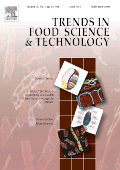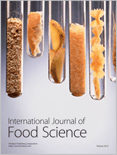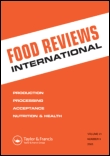
TRENDS IN FOOD SCIENCE & TECHNOLOGY
Scope & Guideline
Driving excellence in food technology and biotechnology.
Introduction
Aims and Scopes
- Food Safety and Quality Assurance:
The journal emphasizes research on methodologies and technologies that improve food safety, including the detection of contaminants, foodborne pathogens, and adulterants. - Sustainable Food Systems:
A core focus on sustainable practices in food production, processing, and packaging, particularly through the valorization of by-products and waste reduction. - Innovative Food Processing Technologies:
Research on novel food processing techniques such as non-thermal methods, 3D printing, and advanced extraction technologies aimed at enhancing food quality and nutrition. - Bioactive Compounds and Functional Foods:
Exploration of the health benefits and applications of bioactive compounds derived from food sources, including their roles in disease prevention and nutrition. - Food Chemistry and Nutritional Science:
Investigations into the chemical properties of food components, their interactions, and how they affect nutritional value and health outcomes. - Consumer Behavior and Food Trends:
Analysis of consumer preferences, trends in food consumption, and the impact of social media on dietary choices. - Food Authentication and Traceability:
Research focused on the development of methods for food authentication, traceability, and quality assurance, ensuring consumer safety and product integrity.
Trending and Emerging
- Plant-Based and Alternative Proteins:
A significant increase in research regarding plant-based proteins and alternative protein sources, including insects and lab-grown meat, reflects the growing consumer demand for sustainable food options. - Smart Food Packaging Solutions:
Emerging technologies in smart packaging, including the use of nanomaterials and intelligent indicators, are gaining attention for their potential to enhance food safety and reduce waste. - Functional Foods and Nutraceuticals:
There is a rising focus on the development of functional foods that provide health benefits beyond basic nutrition, particularly those containing bioactive compounds. - Food Waste Valorization:
Research into innovative methods for utilizing food waste and by-products is increasingly important as sustainability becomes a priority in food production and consumption. - Microbiome and Gut Health:
An emerging theme is the relationship between diet, gut microbiota, and human health, particularly in the context of chronic diseases and overall wellness. - Machine Learning and AI in Food Science:
The application of machine learning and artificial intelligence for food safety, quality assessment, and consumer behavior analysis is rapidly gaining traction. - Sustainable Practices in Food Systems:
Research on sustainable agriculture, circular economy practices, and the environmental impact of food systems is becoming increasingly prevalent.
Declining or Waning
- Traditional Food Preservation Methods:
Research on conventional preservation methods has decreased as innovative technologies such as cold plasma and high-pressure processing gain traction. - Single-Component Nutritional Studies:
There is less emphasis on studies focusing solely on single nutrients, with a shift towards examining food matrices and holistic dietary patterns. - Generalized Food Processing Techniques:
Research that lacks specificity and focuses broadly on food processing has waned, as there is a growing preference for studies that address specific technological advancements or applications. - Basic Agricultural Practices:
The journal has seen less focus on traditional agricultural practices, as the emphasis shifts towards sustainable and innovative agricultural technologies. - Food Fraud in Low-Income Regions:
There is a decline in the exploration of food fraud specifically within low-income countries, as more attention is directed towards global standards and practices.
Similar Journals

Food Chemistry-X
Diving Deep into the Chemistry of Culinary Creations.Food Chemistry-X is a premier open-access journal published by Elsevier, dedicated to advancing the field of food chemistry through high-quality research and comprehensive reviews. With its ISSN of 2590-1575, the journal has gained significant attention since adopting an open-access model in 2019, allowing wide dissemination of knowledge and innovations in food science. Based in the United Kingdom, it holds prestigious Q1 rankings in both Analytical Chemistry and Food Science categories as of 2023, positioning itself as a leading platform for researchers worldwide. The journal's focus spans extensive topics within food chemistry, including food safety, nutritional analysis, and the chemical properties of food, offering insights that are crucial for addressing contemporary challenges in food production and consumption. With a Scopus rank placing it in the 65th percentile among the top journals in Food Science and the 58th percentile in Analytical Chemistry, Food Chemistry-X is an essential resource for academics, professionals, and students seeking to stay at the forefront of research and innovation in this vibrant field.

FOOD TECHNOLOGY AND BIOTECHNOLOGY
Connecting Research and Real-World Applications in Food SafetyFOOD TECHNOLOGY AND BIOTECHNOLOGY is a distinguished peer-reviewed journal published by the Faculty of Food Technology and Biotechnology, University of Zagreb, Croatia. Since its inception in 1993, this Open Access journal has become a crucial platform for disseminating innovative research in the fields of food science, biotechnology, and chemical engineering. With a commendable impact factor and consistent Q2 and Q3 rankings across multiple categories—including Biotechnology, Food Science, and Industrial Engineering—this journal not only fosters academic discussions but also addresses real-world challenges in food production, safety, and sustainability. As it converges its thematic scope from 1996 to 2024, FOOD TECHNOLOGY AND BIOTECHNOLOGY remains committed to advancing knowledge through high-quality research and interdisciplinary collaboration, making it an essential resource for researchers, professionals, and students seeking to stay at the forefront of food innovation and biotechnology.

Journal of Food and Nutrition Research
Championing Research for Optimal Nutrition and HealthJournal of Food and Nutrition Research, published by the VUP FOOD RESEARCH INST in Bratislava, Slovakia, serves as a vital platform for disseminating cutting-edge research in the fields of food science and nutrition. With an ISSN of 1336-8672 and an E-ISSN of 1338-4260, this journal emphasizes the importance of interdisciplinary approaches to address contemporary challenges related to food quality, dietary practices, and nutritional health. Notably recognized in the 2023 Scopus rankings, the journal is classified in Q3 quartiles for both Food Science and Nutrition & Dietetics, providing a forum for researchers aiming to enhance knowledge and practices within these domains. Those engaged in academia and industry will find the journal invaluable for its comprehensive scope, which covers novel food technologies, nutrition interventions, and the implications of dietary behaviors. Though not open access, the journal is dedicated to enriching the academic conversation and contributing to advancements in public health and nutrition policies.

Foods is a premier open access journal published by MDPI, based in Switzerland, that has been at the forefront of disseminating high-quality research in the fields of food science, health professions, and plant science since its establishment in 2012. With an impressive convergence of interdisciplinary studies spanning various aspects of food, nutrition, and microbiology, the journal aims to provide a comprehensive platform for researchers and professionals to share innovative ideas and findings. Maintained as a Q1 journal in multiple categories for 2023, including Food Science and Health Professions, Foods has garnered significant recognition within the academic community, reflected in its strong Scopus rankings and percentiles across various disciplines. The journal not only promotes open access to enhance the visibility and accessibility of research but also encourages the exploration of sustainable food systems and health-related issues, thus contributing to essential discussions in today's society. For those looking to advance their understanding and expertise in food-related sciences, Foods serves as an enduring resource for groundbreaking studies and critical insights.

eFood
Pioneering insights in food technology and nutrition.eFood is a pioneering journal in the field of food science, published by the esteemed WILEY. With its impactful emergence, the journal has rapidly established itself within the academic community, evidenced by its impressive Q1 category ranking in Food Science as of 2023, and a commendable position at Rank #95 out of 389 in the Scopus database. Covering a wide spectrum of topics related to food innovation, technology, safety, and nutrition, eFood serves as an indispensable platform for researchers, industry professionals, and students who are at the forefront of advancing our understanding of food systems. The journal notably operates with an open-access model, promoting wide dissemination of knowledge while enhancing the visibility of high-quality research. As we look forward to converging years from 2020 to 2024, eFood is poised to foster rigorous scientific discourse and contribute significantly to the future of food science research.

International Journal of Food Science
Exploring Innovative Solutions for Global Food ChallengesThe International Journal of Food Science, published by HINDAWI LTD, stands as a crucial platform for advancing knowledge within the realm of food science. Established in 2013, this Open Access journal based in Egypt has garnered significant recognition, achieving an impressive Q2 classification in the 2023 Food Science category, which reflects its commitment to quality and impactful research. With a Scopus rank of #88 out of 389 in Agricultural and Biological Sciences and placing in the 77th percentile, this journal serves as an essential resource for researchers, professionals, and students dedicated to innovative developments and scientific exploration in food science. The journal not only provides unrestricted access to valuable research but also aims to foster collaboration and dissemination of knowledge on critical issues affecting food safety, nutrition, and technology. For those looking to keep abreast of the latest advancements, the International Journal of Food Science is certainly an indispensable addition to their academic pursuits.

Food Biophysics
Delving into the Biophysics of Food InnovationWelcome to Food Biophysics, an esteemed journal published by SPRINGER, dedicated to advancing the field of food science through the lens of biophysics. With an ISSN of 1557-1858 and an E-ISSN of 1557-1866, this journal provides a platform for the dissemination of innovative research from 2006 to 2024. Food Biophysics holds a distinguished position in the academic community, boasting a Q1 ranking in Food Science and Q2 rankings in Analytical Chemistry, Applied Microbiology and Biotechnology, Bioengineering, and Biophysics. This positions the journal in the 73rd percentile for Food Science, signifying its relevance and influence in the field. Although not Open Access, it remains an invaluable resource for researchers, professionals, and students interested in the intricate biophysical properties of food materials and processes. Explore cutting-edge findings that bridge disciplines and advance our understanding of how biophysics can innovate food preservation, safety, and quality.

Food and Bioprocess Technology
Exploring Cutting-Edge Research in Food TechnologyFood and Bioprocess Technology, an esteemed journal published by Springer, serves as a premier platform for disseminating cutting-edge research in the realms of food science, industrial manufacturing engineering, and process chemistry and technology. Established in 2008, the journal has quickly ascended to the prestigious Q1 quartile in multiple categories, highlighting its impact and relevance within the scientific community. With an impressive Scopus ranking that places it in the top tiers of its fields—such as rank #17 in Safety, Risk, Reliability, and Quality, and rank #38 in Food Science—this journal is pivotal for researchers and professionals aiming to publish innovative findings that advance food processing and bioprocess technology. Beyond its rigorous peer-review process, the journal facilitates access to high-quality, impactful research, reinforcing its significant role in shaping the future of biotechnological applications in food systems. Aimed at both scholars and practitioners, Food and Bioprocess Technology is an essential resource for those engaged in exploring sustainable practices and enhancing food quality and safety. Furthermore, by addressing essential topics in the field, it fosters collaboration and knowledge exchange among researchers dedicated to advancing the bioprocessing landscape.

Applied Food Research
Fostering Sustainable Practices Through Research ExcellenceApplied Food Research, published by Elsevier, is an esteemed journal that plays a critical role in advancing the field of Food Science. With an ISSN of 2772-5022, the journal has established itself as a premier outlet for high-quality research, achieving a commendable Q1 ranking in the 2023 Food Science category and a 63rd percentile in Scopus rankings for Agricultural and Biological Sciences. Covering a diverse range of topics from food safety to innovative processing techniques, Applied Food Research seeks to publish pioneering studies that enhance our understanding of food systems and contribute to broader discussions on sustainability and nutrition. As it converges on its fourth year of publication, researchers, professionals, and students alike are encouraged to engage with its content through various open access options, ensuring widespread dissemination of knowledge in a field that is vital to global health and well-being. Operating out of Amsterdam, Netherlands, this journal is poised to be an indispensable resource for anyone dedicated to making significant contributions in the domain of food science.

FOOD REVIEWS INTERNATIONAL
Unlocking the Secrets of Food Science ExcellenceFOOD REVIEWS INTERNATIONAL, published by Taylor & Francis Inc, serves as a pivotal resource within the fields of Food Science and Chemical Engineering. Established in 1985, this esteemed journal offers a comprehensive platform for the dissemination of critical reviews that enhance understanding and innovation in the food industry. With an impressive impact factor reflecting its Q1 quartiles in both Food Science and Chemical Engineering categories, it ranks among the top journals in Scopus, securing the 24th spot in Agricultural and Biological Sciences. Scholars, researchers, and professionals are encouraged to explore its rich content, which spans meticulously reviewed articles that bridge academic research and practical applications, while contributing to advancements in food safety, processing, and sustainability. Although not an Open Access journal, access to its extensive repository is vital for anyone aiming to stay at the forefront of food science advancements.